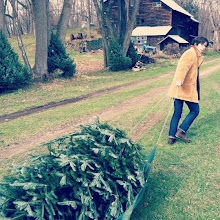
A few years ago, Darbie got me the first third of the New York Review Classics catalogue. The series, described by the NYRB as "an innovative list of fiction and nonfiction for discerning and adventurous readers," is full of interesting, overlooked, often out-of-print oddities, the kinds of things that fall into the "strangely compelling" category.
The Peregrine details a winter J.A. Baker spent obsessively shadowing two peregrines, a falcon (female) and a tiercel (male), near his home in the English countryside. It's strange. He doesn't explain the origins of his interest, doesn't give any details about his personal life, doesn't once, in the course of the book, describe an interaction with another human. His fixation is complete, and works slowly to transform his consciousness. "Wherever he goes, this winter," he writes early in the book:
I will follow him. I will share the fear, and the exaltation, and the boredom, of the hunting life. I will follow him till my predatory human shape no longer darkens in terror the shaken kaleidoscope of colour that stains the deep fovea of his brilliant eye. My pagan head shall sink into the winter land, and there be purified.
Later, his transformation progressing, he describes himself investigating the corpse of a woodpigeon recently killed by the tiercel:
I found myself crouching over the kill, like a mantling hawk. Unconsciously I was imitating the movements of a hawk, as in some primitive ritual; the hunter becoming the thing he hunts. We live, in these days in the open, the same ecstatic fearful life. We shun men. We hate their suddenly uplifted arms, the insanity of their flailing gestures, their erratic scissoring gait, their aimless stumbling ways, the tombstone whiteness of their faces.
It wasn't surprising to learn that, after writing The Peregrine, Baker wrote one more book, The Hill of Summer, then disappeared into obscurity. From the cover page: "...he appears to have worked as a librarian for the remainder of his life. Little else, including the exact year of his death, is known..."
Shortly after reading The Peregrine, I took a walk by the Hudson and flushed a red-tailed hawk. I watched him alight in a tree fifty yards ahead, kept my eyes on his outline, and started slowly approaching him. He wasn't startled by passing cars, but when I got anywhere near, he took off again. I followed him from tree to tree for an hour, trying, and failing, to get close without annoying him and pushing him away. Once, when I lost him high in the branches of a black locust, I noticed a mob of crows cawing in agitation and knew, after reading Baker, to look there for my hawk. I think I'll look for him again later this week...

Reading The Peregrine made me want to revisit another NYRB book I read a while ago: The Goshawk by T.H. White. Rather than tracking a hawk in the wild, White (the author of The Once and Future King) attempts to train one using a book called Treatise of Hawks and Hawking, which was written in 1619. The method requires the austringer (is to hawk as falconer is to falcon) to "watch" the hawk, which means sitting with her on his glove, preventing her from sleeping until she loses the will to resist and agrees to eat from his hand, and thereby "breaking" her. White watches Gos (his goshawk) for four sleepless nights before he has any success, and he and the hawk end up sharing in a strange delirium, which continues through various trials and travails.
In the post-script, written years later, White concedes that using instructions from 1619 for anything, including hawking, may not be the best idea:
Imagine the Tudor staircase in a country house, with all its coats-of-arms and carved balusters and heraldic griffins: compare it mentally with the chromium staircase in a modern hotel: and you will have imagined the difference between what I had been doing to Gos and what a reasonable austringer would do today.
Part of what makes me love both The Goshawk and The Peregrine is precisely that they're not reasonable. They're not written by reasonable people. Rather, both beautifully chronicle the dedicated pursuit of unreason.


No comments:
Post a Comment